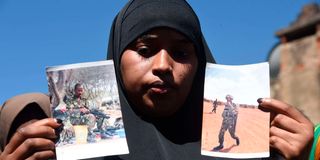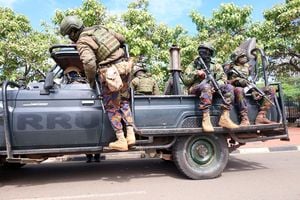
Katra Abdullahi Issa, 27, daughter of Abdullahi Issa Ibrahim, a KDF soldier believed to have been abducted by Al-Shabaab, displays his photos at their home in Eldoret, Uasin Gishu County on January 16, 2025.
Abdullahi Issa Ibrahim had barely been in El Adde for two weeks when Al-Shabaab militants invaded a Kenya Defence Forces camp and inflicted one of the worst attacks in the military outfit’s post-independence history.
He was one of at least three military personnel abducted by the terrorists, and who is seemingly still languishing in an Al-Shabaab prison, following the January 16 release of a video showing him pleading with Kenya’s government to secure his release.
Kenya seems to have given up on ever seeing Ibrahim, a sergeant, and other soldiers captured during the battle of El-Adde.
Ibrahim’s family was issued with a death certificate years ago.
He is just one of at least eight other abductees, military and civilian, whose fate lies in the hands of terrorists who have been known to kill people they kidnap if a ransom is not paid.
Ibrahim’s family has been thrust into anxiety afresh, following Al-Shabaab’s release of the video.
On the one hand, there is hope that they will one day see the decorated soldier, who to them is a father, brother or cousin.
But on the other, he is in the custody of terrorists, who have been known to kill hostages — hence his family is forced to relive the trauma.
In the video, he described his experiences since entering Somalia as part of the 9KR Battalion, based at the Moi Barracks in Eldoret.
“I am a Kenyan soldier. After the attack took place, we expected the Kenyan government would turn out to secure our release so we can reunite with our families," he said in the video captured by Al Kataib.
Government spokesperson Isaac Mwaura on Monday said the authenticity of the videos is yet to be confirmed, but that Kenya is still working to account for those that have been abducted.
“Whilst the authenticity of the video clips has yet to be verified, efforts to confirm the status and whereabouts of the soldiers that were unaccounted for have been ongoing. Due processes for administration of personnel declared missing continues to be adhered to and implemented in support of the families,” Mr Mwaura said.
Mr Ibrahim Adan Issa, the brother of the victim, challenged the government to reach out to the Al-Shabaab militants and have the Kenyan soldiers released.
“As a family, we have been through a lot when my brother dedicated his life to serving his country through the military. We need him back home,” he said.
He revealed that Mr Ibrahim had been part of the peacekeeping mission in Namibia and in South Sudan before he was deployed in Somalia.
“Just like superpower countries can negotiate over prisoners of war, I believe Kenya can do the same and have our brothers in the hands of Al-Shabaab released”, he said.
Ms Raha Abdullahi, the daughter of the officer, expressed the pain she endured after her father was presumed dead.
"It was a difficult moment. I loved my dad, he was so caring. I developed high blood pressure after we only received a death certificate without his body for burial. The recent emotional footage has brought back the past trauma," she said, struggling to contain her emotions.
In 2017, Al-Shabaab released a video of another KDF soldier captured in the El-Adde attack.
That video would be the last anyone, other than the terror group, would hear from or see Alfred Danyi Kilasi.
Mr Kilasi was a senior private at the time of his capture.
“I remember vividly that while we were in El Adde, we were attacked by Al-Shabaab. They infiltrated our camp and took over our defence posts. We lost our comrades and we were captured as prisoners,” he added.
He said that since the attack, a number of them have been in captivity and that there has been no assistance to help them get their freedom.
“I am pleading with the leaders in Kenya, where are you? We are suffering here in Somalia and are in dire need of your assistance. This is an election year and so we are pleading that before you go for elections, look for any means in which you can save us for we are your brethren,” said the officer.
In 2021, the militants released a video of Sergeant Wasike Wanyonyi, a reported KDF soldier in Al-Shabaab jail said to have been captured after the El-Adde attack.
Four years later, little is known about Wanyonyi’s whereabouts.
The Al-Shabaab militants are not just holding the KDF soldiers but even the civilians have been captured and are believed to be in the militants’ custody.
On February 22, 2022, Jackson Kabuu, a medical officer at Fino Dispensary in Mandera County was abducted by armed militants who raided the facility at night. To date, Kabuu’s whereabouts remain unknown.
Mr Cosmas Mwani’s brother Julius Kelly Mwania was abducted on March 11, 2020, leaving behind a wife and a child.
Kelly worked as a mechanic for a bus company operating between Nairobi and Mandera and was abducted while travelling to Mandera.
Efforts by the bus management to have Kelly released from the abductors bore no fruits and his whereabouts have remained unknown.
His wife has since been married elsewhere while the child is staying with Kelly’s mother in Ukambani, according to his brother.
“We have never heard from our brother or from the government. I don’t know if he is alive or was killed,” Cosmas told Nation.Africa by phone.
According to Cosmas, the bus company that his brother worked for has since gone mute on his brother’s fate.
The militants have no regard for age, gender or nationality when they set out to abduct. As long as they can negotiate a ransom or assimilate the victim into Al-Shabaab, anyone is a target.
To date, the fate of Cuban doctors Assel Herrera Correa and Landy Rodriguez Hernandez is unknown.
The two doctors were abducted by Al-Shabaab militants on April 12, 2019, in Mandera County. They were part of a Cuban brigade of 100 doctors working in Kenya following an arrangement between the two countries.
Dr Correa and Dr Hernandez were on their way to Mandera County, where they had been posted, when Al-Shabaab militants attacked and kidnapped them, killing one police officer who was escorting the medical professionals.
In October 2020 Kenya announced that the two doctors had been released.
Initially, Cuba thanked Somalian intelligence operatives for helping negotiate the release of the two doctors, but later said that the two were still in captivity.
In February 2024, Al-Shabaab through Al Kataib Media announced that the two Cuban doctors had died in an American drone strike in Jilib, Somalia.
The militant group at the time said that the two were providing medical services to the community. However, the death reports have never been confirmed by Kenya, Somalia or Cuba.
“The incompetence of the American crusaders and their defective intelligence apparatus has led to the murder of the two hostages,” the militant group said.
In the announcement, they also shared two photos of a body.
At the time Africom, a US-led military alliance with African countries, acknowledged conducting the airstrike in “collective self-defence” and promised further details after ongoing investigations.
But the truth of Al Shabaab’s claim and the fate of the Cuban doctors is still in limbo.
Al-Shabaab, in what is believed to be one of their first abductions, took British tourist Judith Tebutt from Kiwayu Island in Lamu County in September 2011.
Her husband, David, was killed as he tried to fight off the attackers. He succumbed to gunshots in his chest.
Ms Tebutt was released in March 2012 following negotiations brokered by a private military outfit.
Ali Batitu Kololo was sentenced to death in 2011 for Mr Tebutt’s murder and for aiding the attackers who kidnapped Ms Tebutt.
Mr Kololo was released in 2023 after the High Court heard that he was convicted on account of a false testimony by a British police officer, who lied on oath during trial.
Other evidence that would have freed Mr Kololo was also ignored at the initial trial.
Ms Tebutt, after her release, said she did not believe that Mr Kololo was behind the gruesome incident that left her a widow and captive of terrorists for months. Mr Kololo eventually walked free, but after spending 11 years in prison.










